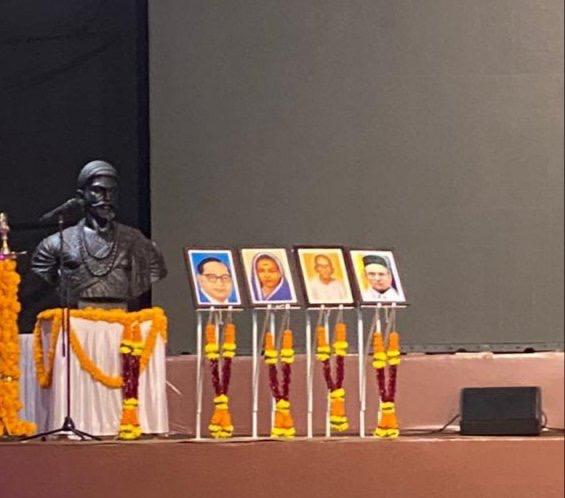Raj Thackeray- the party chief of MNS, is ready to fill the ‘void’ of Shiv Sena, which abandoned Hindutva and its icons, in order to grab power in Maharashtra. The party, which had a flag in saffron, blue, white & green colours, changed it to all saffron in the 23rd January meet. The meet was scheduled on the birthday anniversary of the Bal Thackeray.
It's not just the change of flag for @RajThackeray. For the first time , #savarkar photo also seen on @mnsadhikrut stage. Earlier it was only #DrAmbedkar #savitribaiphule #Prabodhankar alongside the bust of #ShivajiMaharaj. #balasahebthackeray #MNSAdhiveshan2020 #महाराष्ट्रधर्म pic.twitter.com/dYuurWVsUP
— Kamlesh Sutar (@kamleshsutar) January 23, 2020
In the meet, Raj Thackeray inducted his son Amit Thackeray in the party, on the lines of Aaditya Thackeray’s entry in Shiv Sena. When Raj Thackeray formed the party in 2006, his core focus was Marathi Manus (son of the soil) plank, and he raised the issue of Marathi sub-nationalism and anti-immigration in even more chauvinistic way than Shiv Sena.
He never tried to claim Hindutva explicitly, although it remained a weak theme in his campaigns. In the meets and rallies, the party has Dr Ambedkar, Savitribai Phule, and Prabodhankar Thackeray’s photo on the dais, apart from towering Shivaji’s bust.
In the 23rd January meet, the party inducted the photo of Veer Savarkar and changed the flag to all saffron.
Raj Thackeray used to start his speeches with “My Marathi brothers and sisters”, but on 23rd January, his speech started with “My Hindu brothers and sisters”, in a clear indication that, he is all set to claim the Hindutva space vacated by Shiv Sena.
He also supported the NRC exercise and said, “Illegal Muslim immigrants from Bangladesh and Pakistan need to be flushed out.” I asked the Muslims to remove the loudspeakers from the mosques.
The Uddhav Thackeray led party compromised on the issues of Marathi Manus (son of the soil plank) and Hindutva, to ally with NCP-Congress. This has infuriated many younger party workers, who left the party after the alliance government was formed. Balasaheb Thackeray, the patriarch of Shiv Sena, built the party on these core issues, and the party’s alliance with BJP was also on Hindutva grounds. But, the ‘political advisors’ like Sanjay Raut managed to convince Uddhav Thackeray to trade off the ideology for the CM chair.
Raj Thackeray, who learnt politics from his late uncle and Shiv Sena patriarch, could see that there is a space vacated for Hindutva and son of the soil politics. And Raj Thackeray, given his family legacy, is the best person to fill this space.
Raj Thackeray praised and supported PM Modi in 2014 election; later in 2019 general election, he turned into a critic, but never on the core ideological issues like Hindutva. Through his political career, Raj Thackeray fought elections on Hindutva and son-of-soil issues just like his uncle and never compromised on them.
Raj Thackeray is a legitimate inheritor of Bal Thackeray’s politics in terms of personality, political oratory, and almost every other political trait. He delivers speeches on the same fashion; chants the same slogans; is a great crowd puller and so on.
On the other hand, Uddhav Thackeray has none of the traits of a popular politician, and therefore he is playing second fiddle to Pawar family members, despite contributing the maximum number of seats in the alliance. He has been made titular head of state, a de jure leader, put on the chair only to sign on the decisions taken by alliance partners. The plight of Shiv Sena could be witnessed in the portfolio distribution of ministries, where all the significant posts went to NCP.
Raj Thackeray would definitely benefit at the cost of Shiv Sena if he deploys his strategy carefully, as the voter base of both parties is the same. BJP, on the other hand, would find another partner in Maharashtra, which it could call a natural ally, given the ideological similarity. If the parties decided to join hands, both of them will benefit at the cost of Shiv Sena.
